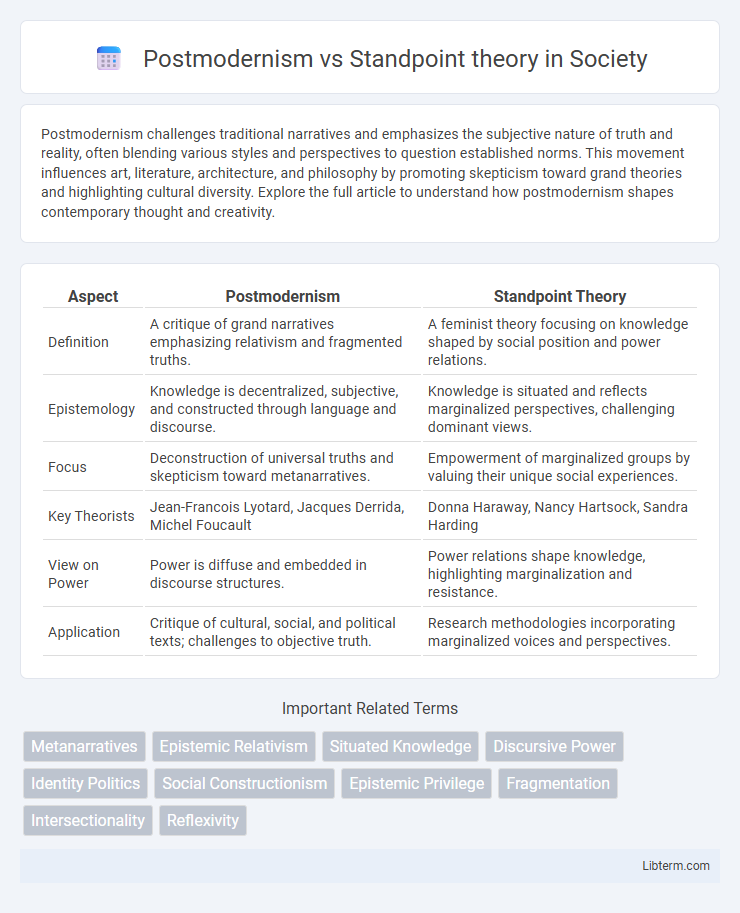Postmodernism challenges traditional narratives and emphasizes the subjective nature of truth and reality, often blending various styles and perspectives to question established norms. This movement influences art, literature, architecture, and philosophy by promoting skepticism toward grand theories and highlighting cultural diversity. Explore the full article to understand how postmodernism shapes contemporary thought and creativity.
Table of Comparison
| Aspect | Postmodernism | Standpoint Theory |
|---|---|---|
| Definition | A critique of grand narratives emphasizing relativism and fragmented truths. | A feminist theory focusing on knowledge shaped by social position and power relations. |
| Epistemology | Knowledge is decentralized, subjective, and constructed through language and discourse. | Knowledge is situated and reflects marginalized perspectives, challenging dominant views. |
| Focus | Deconstruction of universal truths and skepticism toward metanarratives. | Empowerment of marginalized groups by valuing their unique social experiences. |
| Key Theorists | Jean-Francois Lyotard, Jacques Derrida, Michel Foucault | Donna Haraway, Nancy Hartsock, Sandra Harding |
| View on Power | Power is diffuse and embedded in discourse structures. | Power relations shape knowledge, highlighting marginalization and resistance. |
| Application | Critique of cultural, social, and political texts; challenges to objective truth. | Research methodologies incorporating marginalized voices and perspectives. |
Introduction to Postmodernism and Standpoint Theory
Postmodernism challenges traditional narratives by rejecting absolute truths and emphasizing the fluidity of meaning through deconstruction and skepticism towards meta-narratives. Standpoint theory centers on the idea that knowledge is socially situated, asserting that marginalized groups offer unique, valuable perspectives that reveal power dynamics overlooked by dominant viewpoints. Both frameworks critique dominant epistemologies but diverge in approach: postmodernism destabilizes truth itself, while standpoint theory anchors knowledge in social experience and positionality.
Historical Origins and Development
Postmodernism emerged in the mid-20th century as a critique of grand narratives and objective truths, drawing from philosophers like Foucault, Derrida, and Lyotard who emphasized the fluidity of knowledge and power structures. Standpoint theory originated in feminist scholarship during the 1970s, particularly from scholars such as Nancy Hartsock and Dorothy Smith, advocating that marginalized groups possess unique, epistemically privileged perspectives shaped by social and historical contexts. Both theories evolved through interdisciplinary dialogues, with postmodernism challenging universalist claims and standpoint theory focusing on situated knowledge and the political implications of epistemology.
Key Philosophical Foundations
Postmodernism challenges the idea of universal truths by emphasizing the relativity of knowledge and the role of language, power, and social constructs in shaping reality. Standpoint theory asserts that knowledge is socially situated, arguing that marginalized groups possess unique and critical perspectives that reveal power imbalances and systemic inequalities. Both frameworks critique dominant epistemologies but diverge as postmodernism deconstructs meta-narratives, whereas standpoint theory advocates for epistemic privilege grounded in specific social positions.
Concepts of Truth and Reality
Postmodernism challenges the notion of objective truth, emphasizing the relativity of knowledge and the influence of power structures on reality construction. Standpoint theory asserts that truth and reality are shaped by specific social positions, particularly marginalized perspectives, which provide unique and critical insights. Both frameworks critique universal claims but differ as postmodernism deconstructs meta-narratives broadly, while standpoint theory grounds epistemic privilege in lived social experiences.
Perspectives on Knowledge Production
Postmodernism challenges the idea of objective knowledge by emphasizing the role of language, power, and social constructs in shaping truths, suggesting that knowledge is inherently fragmented and contextual. Standpoint theory argues that marginalized groups possess unique epistemic perspectives that reveal power dynamics overlooked by dominant viewpoints, asserting that knowledge production is situated and influenced by social positions. Together, these theories highlight how knowledge is not neutral but produced through specific social lenses that affect whose perspectives are valued or dismissed.
Power, Identity, and Social Positioning
Postmodernism deconstructs power structures by emphasizing fluid identities and rejecting grand narratives, highlighting how knowledge and truth are contingent on social contexts. Standpoint theory centers on marginalized groups' social positions, asserting that power dynamics shape knowledge production, granting those oppressed unique insight into social realities. Both frameworks challenge dominant perspectives, but while postmodernism focuses on the instability of identity and meaning, standpoint theory prioritizes the epistemic authority rooted in specific social experiences.
Critiques and Limitations
Postmodernism faces critiques for its perceived relativism, which can undermine objective truth and lead to skepticism about knowledge claims. Standpoint theory is limited by its potential essentialism, as it risks homogenizing diverse experiences within social groups and overlooking internal differences. Both frameworks challenge dominant paradigms but may struggle to provide concrete pathways for social change or universal applications.
Applications in Academia and Society
Postmodernism in academia challenges universal narratives by emphasizing relativism and the deconstruction of knowledge, influencing diverse fields like literature, sociology, and cultural studies. Standpoint theory, rooted in feminist epistemology, asserts that marginalized groups provide unique and critical perspectives, driving research methodologies in social sciences and gender studies. Both frameworks reshape societal discourse by promoting critical awareness of power dynamics and the value of diverse viewpoints in policy-making and social justice movements.
Comparative Analysis: Key Differences and Similarities
Postmodernism challenges grand narratives and emphasizes relativism, deconstructing established truths, while Standpoint theory centers on marginalized perspectives as sources of knowledge, highlighting the influence of social positions. Both frameworks critique dominant power structures and highlight the importance of context in understanding knowledge production. Differences lie in Postmodernism's skepticism about objective truth contrasted with Standpoint theory's assertion of authoritative knowledge from specific social locations.
Conclusion: Implications for Critical Theory
Postmodernism challenges the idea of universal truths by emphasizing the fluidity of knowledge and the role of power in shaping narratives, which complicates the foundations of Critical Theory. Standpoint theory contributes to Critical Theory by asserting that marginalized perspectives provide epistemic advantages, thereby grounding social critique in lived experience and social location. Integrating both approaches encourages a more nuanced analysis of power structures and knowledge production within Critical Theory, fostering inclusive and dynamic critiques.
Postmodernism Infographic

 libterm.com
libterm.com